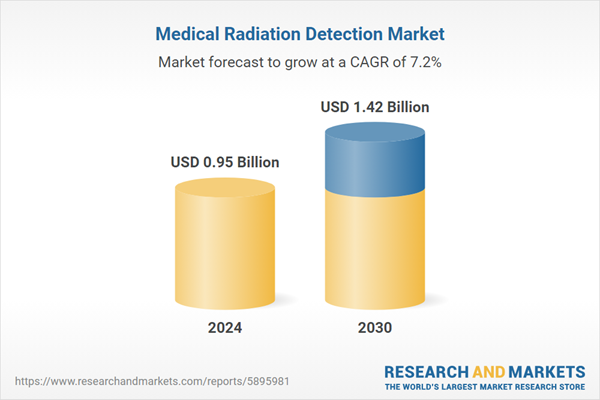Speak directly to the analyst to clarify any post sales queries you may have.
10% Free customizationThis report comes with 10% free customization, enabling you to add data that meets your specific business needs.
The U.S., for instance, is expected to witness approximately 1,958,310 new cancer cases in 2023, averaging about 5,370 cases daily, as reported by the American Cancer Society. Devices such as handheld survey meters (HSM), personal radiation detectors (PRD), radiation portal monitors (RPM), and radiation isotope identification devices (RIID) are vital tools in detecting ionizing radiation. Technological advancements are paving the way for the broader availability of radiation detection tools, including home-use devices like dosimeters that detect gamma rays, a highly dangerous form of external radiation.
Key Market Drivers
Rising Incidence of Cancer
The increasing global burden of cancer is a major factor propelling the growth of the medical radiation detection market. As radiation therapy remains a cornerstone of cancer treatment, the growing number of cancer patients directly correlates with the rising demand for precise radiation detection systems. According to the National Institutes of Health (NIH), around 1,958,310 new cancer cases and 609,820 cancer-related deaths are projected in the U.S. in 2023 alone. This surge in cancer diagnoses is also increasing the use of radiation-based imaging techniques such as CT scans, X-rays, and PET scans, all of which require careful radiation monitoring to protect patient health. Furthermore, with the advancement of personalized medicine, radiation therapy is becoming more targeted, necessitating highly accurate detection systems that ensure optimal dosing while minimizing exposure to surrounding healthy tissues.Key Market Challenges
Technological Complexity
The advanced nature of modern radiation detection technologies poses a significant adoption challenge, particularly for smaller or under-resourced healthcare facilities. These systems often involve complex operations requiring specialized training and expertise, creating a high barrier to entry. Additionally, the elevated upfront costs associated with procurement, training, and maintenance can deter investment. Integration with existing healthcare IT infrastructures, such as EHRs and PACS, also remains a challenge due to compatibility and data-sharing limitations. Moreover, the ongoing need for software updates and equipment maintenance adds to the operational burden, particularly in resource-limited environments.Key Market Trends
AI-Powered Radiation Detection
Artificial Intelligence (AI) is transforming the landscape of medical radiation detection by enhancing the accuracy and efficiency of radiation monitoring systems. AI can process extensive datasets to detect subtle patterns and anomalies that might be overlooked by human operators. This results in more precise radiation dosing, contributing to improved treatment outcomes and patient safety. AI systems also support real-time monitoring and issue alerts when radiation exceeds safe thresholds, allowing for immediate corrective actions. By automating data analysis, these systems reduce the workload on healthcare providers, enabling professionals to dedicate more time to patient care and treatment planning.Key Market Players
- Thermo Fisher Scientific, Inc.
- UAB Polimaster Europe.
- PTW Freiburg GmbH.
- Sanlar imex services private limited.
- Mirion Technologies, Inc.
- MP BIOMEDICALS.
- SIERRA RADIATION DOSIMETRY SERVICE, INC.
- IBA Dosimetry GmbH.
Report Scope:
In this report, the Global Medical Radiation Detection Market has been segmented into the following categories, in addition to the industry trends which have also been detailed below:Medical Radiation Detection Market, By Type:
- Gas-filled Detector
- Scintillators
Medical Radiation Detection Market, By Product:
- Personal Dosimeters
- Area Process Dosimeters
Medical Radiation Detection Market, By End Use:
- Hospitals
- Ambulatory Surgical Centers
- Diagnostic Imaging Centers
- Homecare
Medical Radiation Detection Market, By Region:
- North America
- United States
- Canada
- Mexico
- Europe
- France
- United Kingdom
- Italy
- Germany
- Spain
- Asia-Pacific
- China
- India
- Japan
- Australia
- South Korea
- South America
- Brazil
- Argentina
- Colombia
- Middle East & Africa
- South Africa
- Saudi Arabia
- UAE
Competitive Landscape
Company Profiles: Detailed analysis of the major companies present in the Global Medical Radiation Detection Market.Available Customizations:
With the given market data, the publisher offers customizations according to a company's specific needs. The following customization options are available for the report.Company Information
- Detailed analysis and profiling of additional market players (up to five).
This product will be delivered within 1-3 business days.
Table of Contents
Companies Mentioned
- Thermo Fisher Scientific, Inc.
- UAB Polimaster Europe.
- PTW Freiburg GmbH.
- Sanlar imex services private limited.
- Mirion Technologies, Inc.
- MP BIOMEDICALS.
- SIERRA RADIATION DOSIMETRY SERVICE, INC.
- IBA Dosimetry GmbH.
Table Information
| Report Attribute | Details |
|---|---|
| No. of Pages | 183 |
| Published | July 2025 |
| Forecast Period | 2024 - 2030 |
| Estimated Market Value ( USD | $ 0.95 Billion |
| Forecasted Market Value ( USD | $ 1.42 Billion |
| Compound Annual Growth Rate | 7.1% |
| Regions Covered | Global |
| No. of Companies Mentioned | 8 |









